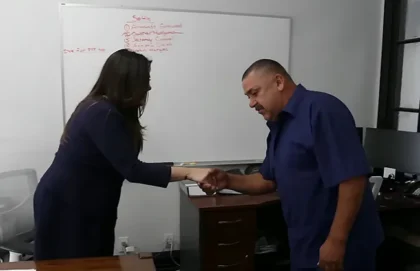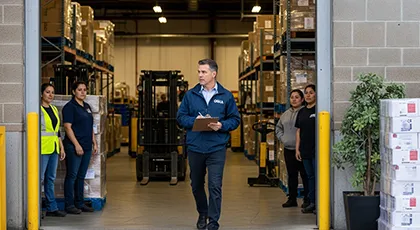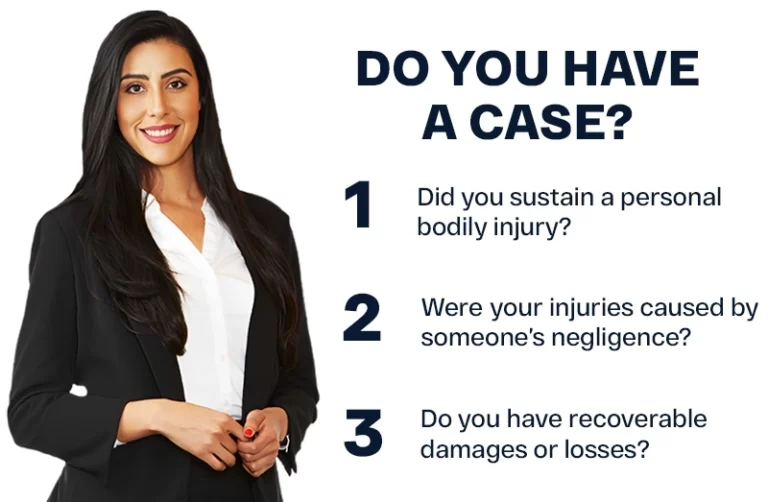TL;DR: You may be able to sue a company for putting you in danger if its negligence caused actual harm, such as injury, financial loss, or emotional distress. To have a valid claim, you must prove that the company owed you a duty of care, breached it, and caused measurable damages.
Table of Contents
Yes, you can sue a company for putting you in danger, but only if their actions or negligence resulted in actual harm. To bring a valid lawsuit, the company must have owed you a duty of care, violated that duty, and caused physical injury, financial loss, or emotional distress.
The legal rules differ, depending on whether or not you’re an employee of the company:
- If you work for the company, you usually can’t sue your employer directly. Instead, you may need to file a workers’ compensation claim. However, lawsuits are sometimes allowed in cases involving intentional misconduct or third-party negligence.
- If you don’t work for the company, you may sue as a customer, contractor, or passerby if the company failed to meet safety obligations and caused your injury.
You may have a valid legal claim if:
- The company owed you a legal duty (e.g., safety standards, customer protections).
- It breached that duty through negligence or unsafe conduct.
- You suffered measurable harm (injuries, income loss, or trauma).
Whether you’re on the job or just visiting, companies have a legal responsibility to keep people safe. If they put you in danger and it led to harm, a personal injury lawyer can help you explore your legal options.
Talking to an injury attorney can help you understand your rights based on the specific details of your situation. To get started, complete our “Do I Have A Case?” form. An attorney can review your situation and explain your legal options.
Unsafe Company Practices That Can Result In Legal Action
Companies may put people at risk through many forms of negligence. When that negligence causes actual harm, injured individuals may have the right to pursue legal action. Below are common work-related and non-work-related situations that may lead to a personal injury claim.
When You Can Sue Your Employer
Workplace injuries are among the most common ways companies endanger people. According to the Occupational Safety and Health Administration (OSHA), employers are required to provide safe conditions, follow industry-specific safety standards, and protect workers from unnecessary risks. When they fail to do so, employees may sustain injuries on the job.
Under OSHA, employers must provide a safe workplace. When they fail, injuries may occur due to:
- Wet, uneven, or cluttered floors
- Exposed electrical wiring
- Faulty machinery
- Lack of protective gear
- Poor emergency exits
- Toxic chemicals or fumes
Most workers cannot sue their employer directly for injuries from a workplace accident. Instead, they file for workers’ compensation. Workers’ compensation attorneys can guide injured employees through the claims process and help determine if any exceptions apply. Lawsuits may be allowed in specific cases, including the following:
- Intentional Misconduct by Employers — Employees may sue for intentional misconduct if the employer knowingly allowed dangerous work conditions without making corrections. They may also have a case if the employer ignored OSHA rules and failed to provide the required safety gear.
- Third-Party Liability on the Job — Sometimes, employees may sustain a work injury due to someone other than the employer. These third-party claims may involve:
- Property owners who failed to fix hazards at a job site.
- Contractors whose actions caused the injury.
- Manufacturers of unsafe equipment or tools.
In many situations, a negligent driver may injure someone while they are on the job. Car accident claims lawyers can help pursue compensation from the at-fault party or their insurer, even if the crash happened during work hours.
When You Can Sue A Company You Don’t Work For
Even if you don’t work for a company, you may sue if their negligence puts you in danger and causes harm. This includes:
- Faulty Products — You may have a case if a defective product caused your injury. Under California law, companies can be held responsible even without proving negligence.
Examples:
- A phone battery that explodes.
- A coffee maker that catches fire.
- A medical device that malfunctions.
- A defective airbag that deploys without a crash.
These product liability cases often require expert testimony and detailed investigation. A personal injury lawyer can help gather the evidence needed to prove the product was defective.
- Unsafe Property Conditions — Companies must keep their buildings safe. You may sue if you’re hurt by:
- Slippery floors
- Broken stairs or elevators
- Blocked fire exits
- Damaged furniture
Premises liability lawyers can assess whether unsafe conditions were caused by negligence and guide you through the process of pursuing a claim.
- Negligent Hiring — In California, companies may be liable if they knew or should have known the person they hired was unfit for the job at the time of hiring.
To reduce the risk of harm, companies must take proper steps when hiring. These may include:
- Running background checks.
- Conducting drug tests.
- Calling references and past employers.
If a company ignores warning signs and hires someone likely to cause harm, it may be held responsible for any resulting injuries. Although employers should avoid discrimination, they must still train workers properly and make sure they are safe to work with the public.
Employment lawyers can help address cases where poor hiring practices or workplace safety violations expose employees and the public to danger, such as:
- A reckless delivery driver causes a crash.
- A technician injures someone inside a customer’s home.
Negligent hiring is a common issue in truck or rideshare accident cases where poor hiring decisions contribute to the crash. Accident lawyers can help victims determine whether the company failed to screen or train the worker properly.
- Environmental Dangers — Companies that mishandle toxic materials can put workers, nearby residents, and customers at risk. Common dangers include:
- Toxic fumes (like benzene or formaldehyde) that cause breathing issues or increase cancer risk.
- Chemical leaks (lead, arsenic, pesticides) that affect soil or water and harm health.
- Pollutants (oil, solvents, heavy metals) from poor waste handling trigger rashes or illness.
- Dust or gases (asbestos, silica, fiberglass) that damage the lungs.
- Explosions or fires that release harmful gases like ammonia or chlorine.
If you suffered harm due to a company’s environmental negligence, you may be able to file a personal injury claim. Chemical exposure injury attorneys can review medical records, workplace safety reports, and environmental testing results to help build a case for compensation.
If A Company Puts Me In Danger, How Does A Personal Injury Lawyer Prove Liability?
Simply being in danger usually isn’t enough for a lawsuit. However, if that danger causes actual harm or damage, the injured person may have a valid case. There must be a physical injury, financial loss, or other measurable harm. The specific facts of the situation determine whether a victim may file a claim. A personal injury attorney can review your situation and explain your legal options.
Personal injury attorneys build cases by establishing the four essential elements of negligence. Understanding these elements helps you recognize whether your situation meets the criteria for a valid lawsuit:
- Duty of Care — The company owes you a duty of care. For example, employers must maintain workplace safety. Businesses must also address known hazards to keep customers and visitors safe.
- Breach of Duty — You must show that the company violated its legal duty of care. For example, if a store knows about a pothole in its parking lot but does not repair it or warn people, the store may have breached its duty of care.
- Causation — The breach of duty caused the injury. For example, a company hires a driver with a known reckless history. If that driver causes an accident, the company may be liable for negligent hiring.
- Damages — You must show that the injury caused real harm or losses. Examples are medical bills, lost wages, or pain and suffering.
Additional Legal Concepts That Can Establish Company Liability
Beyond negligence claims, attorneys often use other legal theories to establish corporate liability. Here are some of them:
Vicarious Liability
Under this concept, a company may be held responsible for the negligence of its employees while they are performing their duties. Here are some scenarios where vicarious liability may apply:
- A truck driver causes a crash while making deliveries, injuring other drivers, passengers, or pedestrians.
- A rideshare driver hits a passenger or pedestrian because of careless driving. Depending on the situation, the rideshare company could share liability.
- A delivery truck driver fails to secure cargo properly, causing items to fall and injure people nearby.
Strict Liability
Strict liability holds a manufacturer or company responsible for injuries caused by defective products. An injury victim can initiate a claim without the need to establish negligence. Experienced personal injury lawyers can help you take the necessary steps if a company’s actions or products put you in danger.
Here are some points to remember about strict liability:
- A flaw must exist in the product when the manufacturer, seller, or distributor puts it into the market.
- Defects may occur in the design, during manufacturing, or due to missing instructions or warnings.
- The defect must directly cause harm or injury.
- The injured person does not need to prove the company was negligent or intended to cause harm.
A personal injury lawyer can evaluate which legal theory fits your case and help you take the right steps if a company’s product or employee caused your injury.
Possible Damages In A Personal Injury Claim Against A Company
Damages in a personal injury case compensate you for the harm you suffered due to a company’s actions or failures. The types and amounts of damages vary because each victim’s situation is different. Some people suffer minor injuries such as cuts, lacerations, and bruises, while others may suffer more serious injuries like traumatic brain injuries, spinal cord damage, or severe burns.
Personal injury lawyers can help evaluate your case and explain which damages may be available. If the evidence supports a valid claim, they can guide you through the legal process. Depending on the case, different types of damages may apply. These may include:
- Economic Damages — These cover costs you have paid or will have to pay, such as:
- Medical Bills — These cover medical costs related to the injuries, such as hospital stays, doctor visits, therapy, and future medical care. They may also pay for necessary treatments such as physical therapy, chiropractic treatment, or counseling.
- Lost Income — You may receive reimbursement for your lost wages. You also may qualify for loss of future income and reduced capacity to earn if the injury resulted in disability.
- Property Damage — You may get compensated for the costs of repairing or replacing damaged property, such as cars, personal belongings, or even your home.
- Other Out-of-Pocket Expenses — These are additional costs due to the injury, such as travel for treatment, temporary lodging, medical equipment, or home modifications.
- Non-Economic Damages — These are losses that do not have a clear dollar value. They may include:
- Pain and suffering
- Emotional distress
- Loss of enjoyment of life
- Permanent scarring
- Disfigurement
- Loss of companionship
A personal injury lawyer can explain which damages may apply in your situation and help gather the evidence needed to support your claim.
What To Do After A Company Endangers You
If a company’s actions or unsafe conditions put you at risk, reporting the issue and protecting your health should be your top priorities. Here are some steps to consider, depending on your situation:
- Contact the Company — Send a formal letter or email to explain the safety issue.
- Report to Your Supervisor — If the hazard occurred at work, notify your manager or supervisor immediately.
- Notify the Appropriate Agency — It may be different in certain scenarios:
- For Defective Products — Report them to the government agency that handles consumer safety. In California, you can contact the Department of Consumer Affairs (DCA) to alert officials about the danger.
- For Unaddressed Safety Issues at Work — If your employer or supervisor does not fix the problem, you can report the unsafe condition to OSHA.
Even if no injury has occurred yet, reporting the danger could help prevent harm to others. However, if the risk eventually causes an injury, you should take these steps to protect your health and your rights:
Get Medical Help Immediately
Some injuries don’t show symptoms immediately; it is advisable to consult a doctor in case you have underlying injuries. Your health is the most important thing.
- Call 911 or go to the nearest emergency room. If it happened on the job, ask your supervisor to assist you in getting immediate medical attention.
- For minor workplace injuries, your employer may have first aid supplies. You may also need to visit a doctor approved by your employer’s workers’ compensation insurance.
Always tell your doctor exactly how you got hurt. It will allow them to provide the proper medical treatment for your injury. Accurate records can support your case if you decide to file a claim later.
Inform The Company About The Injury
If you sustain injuries because of a company, it is advisable to inform them about the incident. The company involved may be different depending on your situation:
- Workplace Accidents — Notify employers, contractors, work equipment manufacturers, property owners, or companies in charge of maintenance.
- Faulty Products — You may need to inform the manufacturer, supplier, or distributor. In cases where a defective product causes electrocution or other serious injuries, electrocution accident lawyers can help identify liable parties and guide you through the claims process.
- Premises Liability — If you slipped, tripped, or fell on a company’s property, inform the company that owns or operates the premises.
- Motor Vehicle Accidents — In crashes involving trucks or rideshare vehicles, you may need to notify the trucking company, rideshare service, or another business involved in its operation. Car accident lawyers can take over legal correspondence if you decide to hire one.
File An Official Report If Necessary
Depending on the situation, it may be necessary to file a report. For example, people typically notify the police after traffic accidents, contact OSHA about unsafe work conditions, or alert the DCA or a similar agency if a faulty product causes harm.
Consult A Personal Injury Lawyer
It can be helpful to consult an attorney about your situation. Personal injury lawyers can:
- Review the details to see if there is a possible case.
- Help you report the issue if you’re unsure where to start.
- Investigate to find out who may be responsible for the injury.
- Handle discussions or negotiations when the evidence supports pursuing a claim.
Frequently Asked Questions About Suing A Company That Put You In Danger
Below are some common legal questions from people who believe a company may be responsible for their injuries or harm. Just being in danger is not enough reason for a lawsuit. However, if the threat caused real harm or damage, the evidence may support pursuing a legal claim. The outcome will depend on the specific facts of the case.
If you have legal questions, fill out our contact form. We offer a free initial consultation to review your situation and explain your legal options.
What Evidence Do I Need?
Building a strong case against a company requires comprehensive evidence collection. Your attorney will gather the following documentation as needed:
- Medical records documenting your injuries.
- Witness statements that describe the dangerous conditions.
- Company safety records.
- Maintenance logs.
- Expert testimony explaining how the company’s negligence caused your harm.
- Photographs of the scene, your injuries, and any defective products.
The sooner you contact a personal injury attorney, the better your chances of preserving key evidence before it gets lost or destroyed.
How Much Does It Cost To Sue A Company That Injured Me?
The cost of hiring an attorney will depend on how each law firm charges for its services. Most personal injury lawyers work on a contingency fee basis, meaning you pay no attorney fees unless we win your case. However, regardless of the case outcome, you may still be responsible for certain case-related costs. We will clearly explain all potential costs before moving forward with your case.
How Long Do I Have To Sue A Company That Injured Me?
In California, you have two years from the date of the accident to sue a company for putting you in danger. This strict deadline, known as the statute of limitations, rarely allows exceptions, making it crucial to consult with an attorney promptly after your injury occurs.
Certain situations can change the timeframe for filing a company negligence lawsuit in California. For example:
- Delayed Discovery — If you did not immediately know about the injury, the deadline may be based on the date you discovered it.
- Minor Victims — If the injured person is under 18, the time limit usually does not begin until they turn 18. A parent or guardian may be able to file on their behalf.
Other exceptions may apply depending on the case. Working with personal injury attorneys with experience in these situations can be beneficial. They can explain your options and how long you have to file a claim if your case is valid.
Can OSHA Help You Sue Your Employer Or Company?
You may sue your employer if you get hurt or sick from dangerous conditions, especially if they knew and ignored the dangers. However, OSHA itself does not help you file a lawsuit.
If OSHA investigates and finds violations, its reports can serve as supporting evidence in your case. A workplace injury attorney can help you explore your options and build a claim if your employer is at fault.
Reach Out To Our Injury Lawyers For Legal Guidance
Companies have a legal duty to protect employees, customers, visitors, and even passersby from harm. You might be thinking, “I need a personal injury lawyer, but how do I know if I’ve found a good fit?” Consider these factors when making your decision:
- Clear Communication — They explain your legal options and case strategy in plain language you can understand.
- Responsiveness — They return your calls or messages promptly and keep you updated regularly.
- Experience Fit — Their background and practice areas align closely with your type of legal issue.
- Professional Reputation — They have excellent reviews, referrals, and positive feedback from clients and peers.
- Comfort & Trust — You feel confident that they are committed to your case and focused on your legal objectives.
Our personal injury lawyers here at Arash Law assist individuals who suffer injuries due to careless or reckless businesses. We support injury victims regardless of their immigration status or financial situation. You may still have legal rights even if you think you can’t afford an attorney.
If your injuries make it hard to travel, we can arrange to meet with you anywhere in California. Our team is committed to clear and effective communication. If you need assistance in another language, we can arrange for translation services to help you understand each step of the process. Call Arash Law at (888) 488-1391 to schedule a free initial consultation.














